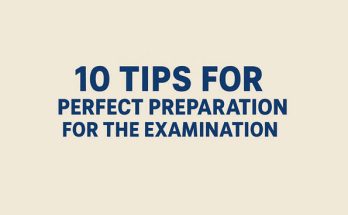How to Analyse Past Papers
One of the best resources to prepare for an exam is past papers. Not only will they give you an idea of the types of questions you can expect, but they will also highlight the patterns and key areas that are commonly tested. But just solving past papers isn’t sufficient. With this resource, however, you must do the following to make it effective. We will discuss how to prepare for the GRE effectively, with tips and techniques to help ensure that your preparation is as efficient and focused as possible.

Importance of Analyzing Past Papers
First, let’s take a look at why you should analyse past papers as you prepare for your exam
Pinpoint Important Topics: By working through past papers, you become aware of which areas of the syllabus are tested more frequently, helping you focus your studies to address parts of the syllabus that will most likely show up in your examination.
Familiarize Yourself with Question Patterns: Studying past papers will help you identify different formats and types of questions (such as multiple-choice, essay, short answer).
Familiarizing with the exam format: By practicing past papers, you familiarize yourself with the types of questions that may appear and their format, enhancing your knowledge of the exam structure.
Revise Exam Technique: Going through past papers helps in formulating effective strategies for answering papers, spotting keywords, and answering difficult questions.
Step 1: Find Your Past Papers
They say the first step in learning how to Analyse Past Papers is to collect them. This means you will need to collect as many past papers as you can from the subject you are studying for. You’ll find that many schools and online platforms offer past papers for different subjects. If you’re unsure where to look, ask your school, teacher, or college, or search online for reputable educational sites.
The key is to have a multitude of past papers. It widens your horizon concerning the nature of questions that can come, and you can cover all possible areas.
Step 2: Understand the Exam Structure
So, the next part of learning how to Analyse Past Papers, once you have your past papers, is to familiarize yourself with the exam structure. Take note of the following:
- Time: What is the allotted time for the examination?
- Sections: Is the exam separated into distinct sections (ex, multiple-choice, short-answer, essays)?
- Are some sections weighted more heavily than others?
Know the weightage of each section in the examination pattern so that you can prepare accordingly. This will help you manage your time well in the real exam.
Step 3: Identify Patterns and Themes
Recognizing the themes and topics that recur is one of the most important elements of How to Analyse Past Papers. Also, while you read through the past papers, mark questions that come up in several years. This will help you understand exactly which topics are most commonly tested.
Some topics for example, maths or science, may include formulas or main ideas that keep coming back. In comparison, essay-style subjects do have themes or issues that seem to come up year after year. Identify these and then tailor your revision to these fundamental topics.
Step 4: Analyse the Question Formats
A deep understanding of how to Analyse Past Papers also requires some work to look at questions, too. Are they mostly straightforward questions, or are they structured with Critical Thinking/Analysis in mind? Here are some things to keep in mind:
- Clarity of Questions: Do the questions make sense or need to be deciphered?
- Answer type: Are the questions short answers, essays, or methods?
- Question Toughness: Limitations in some questions being difficult? How are they framed?
When you have familiarizers, you’ll know what types of questions come and how to make it relatable to solve them fast during the exam.
Step 5: Time Yourself
So, time yourself like you’re actually taking the paper when you’re answering past papers. It will show you how long you need for each section and will allow you to practice working under time pressure.
By timing yourself regularly, you will enhance your pacing capabilities throughout the actual exam, which will help ensure you hit all questions.
Step 6: Assess How You Did
Evaluate performance after completing a past paper. The next step in learning how to Analyse Past Papers is evaluating performance. Review each of your answers critically and locate any incorrect responses. Read the solutions and learn why particular answers are right or wrong. Ask yourself:
- Did I skip over anything critical?
- Did I manage my time effectively?
- Would a better structure of my answers have been helpful?
This reflective process teaches you from mistakes and will help your exam technique overall. It also lets you know the areas you should work on in your future revision sessions.
Step 7: Create a Study Plan from Your Analysis
The Outputs That Let You Build Sections That Match the Study Plan You’ll Create from Analyzing Past Papers. Spend more time covering topics that were tested frequently and spend additional time on areas where you were weaker. Nonetheless, a study plan is useful for maintaining organization and ensuring you have focused on all areas in preparation for the exam.

Conclusion
The purpose of learning how to Analyse Past Papers is a crucial technique for any pupil who wants to do well in their tests. By doing so, you will have a better grasp of the exam structure, big topics, and your performance in the exam. Then, getting back and reviewing past papers will help you to work smarter, it’s work smart, so you can revise efficiently and target. Focused preparation for an exam is not just rote memorization of the facts but focusing on how to apply that information in an exam scenario. However, with consistent practice and qualification through analysis, you will have the confidence to approach your exams and achieve the results you deserve.
FAQs
Past Papers Analysis: How many should I analyse?
So, at least do a practice analysis over 5-10 years of past papers to have a more complete picture of the topics that keep coming up and the formats of questions. Understanding the exam trends better is just a matter of analysis.
Are past papers helping with time management?
Absolutely! Using timed past papers will also give you a better idea of how much you need to write for each section of the paper.



